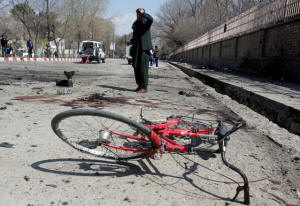|
Suicide bomber kills at least 29 near
shrine in Afghan capital
 Send a link to a friend
Send a link to a friend
 [March 21, 2018]
By Hamid Shalizi and Sayed Hassib [March 21, 2018]
By Hamid Shalizi and Sayed Hassib
KABUL (Reuters) - A suicide bomber blew
himself up near a Shi'ite shrine in Kabul on Wednesday, killing at least
29 people and wounding dozens, officials said, as the Afghan capital
celebrated the Nawruz holiday marking the start of the Persian new year.
The explosion underlined the threat to the city from militant attacks,
despite government promises to tighten security in the wake of an attack
in January that killed around 100 people.
Militant group Islamic State, which has claimed several previous attacks
on Shi'ite targets, claimed responsibility, its Amaq news agency said.
The Taliban issued a statement denying any connection.
Kabul had been on alert for attacks over the Nawruz holiday but the
bomber was still able to detonate his explosives as people were leaving
the Kart-e Sakhi shrine, in a heavily Shi'ite area in the west of the
city.

"When the explosion took place, I fell to the ground and I saw many
people on the ground around me," said Ramazan, who was wounded in the
blast at the shrine, near the city's main university.
Interior Ministry spokesman Najib Danesh said the bomber had apparently
intended to reach the shrine, which was attacked during a Shi'ite
festival in October 2016, but had been prevented from getting closer by
police checkpoints.
"We had our security in place in and around the shrine," he said. "All
the casualties were young people who were either passing by on the road
or gathering to enjoy Nawruz."
[to top of second column]
|

An Afghan man inspects the site of a suicide attack in Kabul,
Afghanistan March 21, 2018. REUTERS/Omar Sobhani

Dr Waheed Majroh, a spokesman for the ministry of public health, said 29
people were confirmed dead with 52 wounded being treated in hospitals in
the city. Women and children were among the casualties, he said.
Nawruz, an ancient Persian celebration of the start of spring, is widely
celebrated in many parts of Afghanistan but has also faced opposition
from some fundamentalist Muslims, who say it is un-Islamic.
The seemingly endless attacks have undermined support for the government
of President Ashraf Ghani, who offered last month to hold peace talks
with Taliban insurgents fighting to drive out international forces and
reimpose their version of strict Islamic law.
The Taliban have so far shown little sign of accepting the offer of
talks with the Western-backed government, which they consider an
illegitimate, foreign-imposed regime, although they have offered to talk
to the United States.
(Additional reporting by Mohammad Aziz and Omar Fahmy in CAIRO; Writing
by James Mackenzie; Editing by Nick Macfie and Clarence Fernandez)
[© 2018 Thomson Reuters. All rights
reserved.]
Copyright 2018 Reuters. All rights reserved. This material may not be published,
broadcast, rewritten or redistributed.
Thompson Reuters is solely responsible for this content.
 |